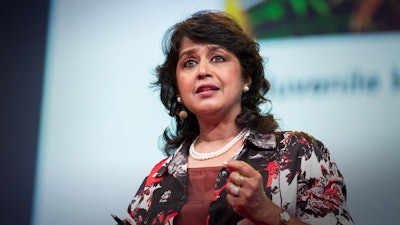 Ameenah Gurib-Fakim is president of Mauritius.
Ameenah Gurib-Fakim is president of Mauritius.CAPE TOWN, SOUTH AFRICA —The president of Mauritius — the small island nation in southeast Africa — issued an alarming prognosis. Unless STEM disciplines are promoted throughout her continent, she said that African youngsters will continue to lag far behind their international counterparts.
“As a scientist, I remain convinced that strong institutions, science, technology, innovation and higher education are prime movers and will continue to play a profound role in advancing knowledge and improving the human condition,” said Ameenah Gurib-Fakim, a former biodiversity scientist, who was elected as the nation’s first woman president last year.
Gurib-Fakim made her remarks to more than 1,000 participants who traveled here to participate in the Going Global conference, one of the largest gatherings of educators from throughout the world. Sponsored by the British Council, the annual event brings together thinkers, philanthropists and policy experts to strategize on how best to promote international education and globalization.
“I am convinced that the social and economic transformation of the African continent will happen only when higher education, better access to health care and greater emphasis on knowledge becomes central to the development debate,” said Gurib-Fakim, who pointed out that, although Sub-Saharan Africa is one of the fastest-growing regions in the world, it continues to linger behind other parts of the world in the area of technological advancements.
She said the African continent has to be more proactive in promoting research and development opportunities and that colleges and universities should establish stronger ties to industries if new economic possibilities are to be readily identified.
“The link between technology and the economy can no longer be overlooked,” she said. “Innovation is pushing ahead at warp speed. As Africans, we need to become producers and not just consumers of knowledge and we should capitalize on the momentum gained at the global level while recognizing that all actions are local. We have to mobilize cutting-edge knowledge and forge partnerships anchored in the common ground for the benefit of all and become the voice of change.”
Gurib-Fakim’s comments come after decades of concerns that the continent has not been able to improve its standing in the arena of technology inventions and entrepreneurship. While internet access is becoming more available throughout the continent, only 19 percent of the overall population in Africa are using the web, according to a recent report released by the International Telecommunications Union, a United Nation’s agency.
In response to the looming crisis, billionaire Bill Gates, along with Facebook CEO Mark Zuckerberg, have pumped millions of their own dollars to fund programs and initiatives across the continent aimed at shifting this tide.
But Gurib-Fakim said that African governments can and should do more, too.
“Nations that have excelled at innovation have benefited from substantial government investment, especially in building higher education systems and in the training of outstanding young minds in information technology, science, engineering and related fields,” she said. “Africa has tremendous potential. It is home to more than 30 percent of the world’s mineral reserves. Properly managed, these endowments offer unparalleled opportunity for economic growth and development.”
In a symbolic act of global partnerships, three research chairs between South Africa and the United Kingdom were announced at the conference. The initiative, which is funded by Britain’s Newton Fund and the National Research Foundation in South Africa, will strengthen research in South Africa and the UK, promote international exchange, and increase the number of master’s and Ph.D. graduates in both countries.
“This is a huge opportunity for our country and our continent,” said Naledi Pandor, South Africa’s minister of science and technology. “It encourages the best scientists to work in South Africa. It encourages the best to stay at home.”
Jamal Eric Watson can be reached at jwatson1@diverseeducation. You can follow him on Twitter @jamalericwatson















